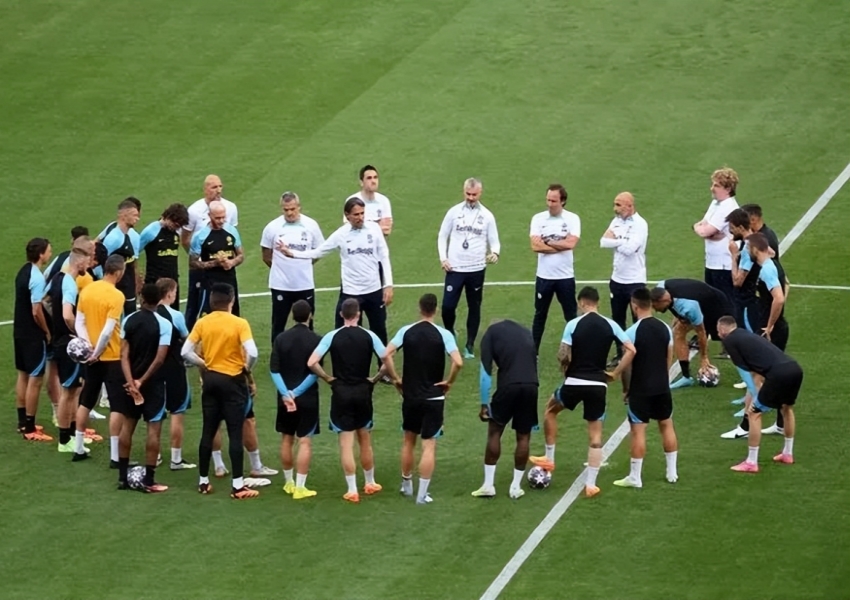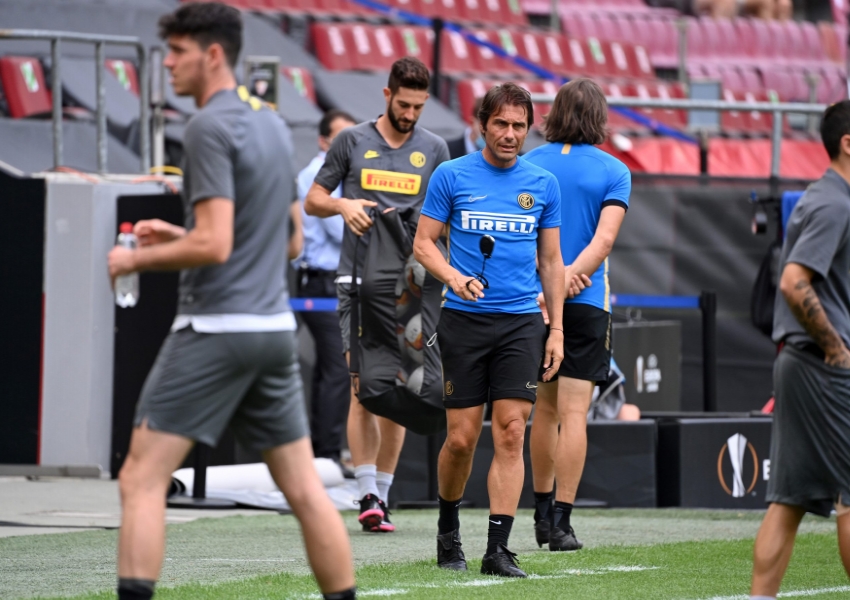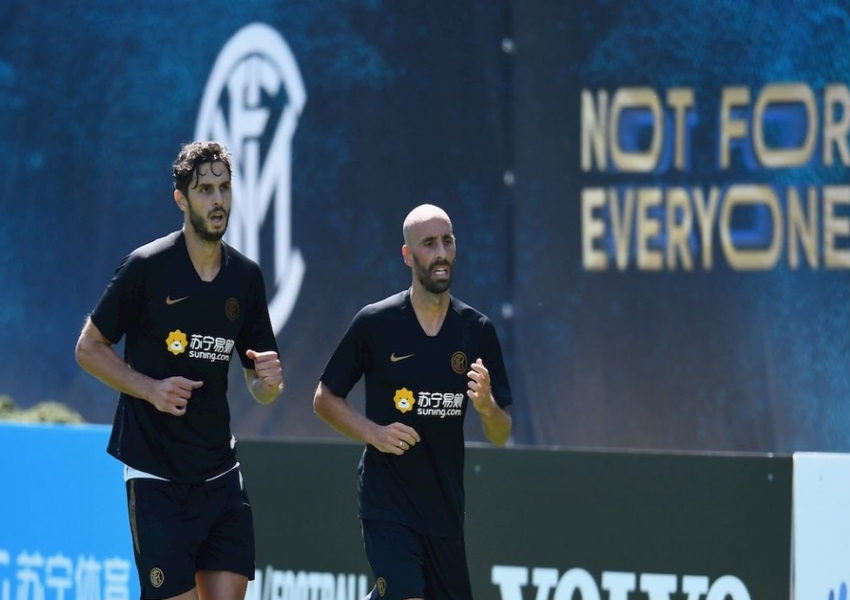Inter Milan Leaves Behind the "Loose Reins" Era: Coach Rejects Stars, Four Reasons Boost Prestige
Coaching Inter Milan is never an easy task. Take Simone Inzaghi, for example. When he wins, he's praised as a genius; when he loses, he's criticized harshly. However, some changes should not be overshadowed by a results-only perspective. The significant shift emphasized by La Gazzetta dello Sport is Inzaghi's newfound assertiveness this season. What's the change? Saying no to his players.

The Shift in Simone Inzaghi's Approach
In Inter’s 1-0 victory over Roma, it took 80 minutes to break the deadlock, a hard-fought win. Following this, Inter had a rare midweek without a double fixture. Naturally, many players requested a day off as a reward for defeating a strong opponent. Inzaghi, however, refused their request. He pointed out that while there was no midweek match, the upcoming game against Atalanta was on Saturday and away, followed by a Champions League away match. More importantly, starting late November, Inter would face a brutal schedule with back-to-back away games against Juventus, Benfica, and Napoli. Before this grueling period, Inter needed to gather as many points as possible in the league to create a buffer for the tough winter battles. Therefore, Inzaghi believed that while the win against Roma was delightful, there was no room for complacency. Hence, no day off! As for "rewards," he verbally praised the players in the following training session, deeming it sufficient.

This seemingly minor incident is crucial. Those familiar with Inter's recent history know that Inzaghi's ability to say no to players marks an important change. During Antonio Conte's tenure, the team experienced a high-pressure management style. Despite having an older squad, limited rotation, and a packed schedule, Conte maintained high-intensity training, which was grueling for the players. After key victories, players often sought a day off as a reward, but Conte usually refused, treating them like employees under a strict, workaholic boss. This approach left the players both physically and mentally exhausted over the years.

Transition from Conte to Inzaghi
After Conte’s departure, the management style at Inter shifted. Initially, Inzaghi, coming from a smaller club, was concerned about managing the senior and strong-willed players in the locker room. He often chose to appease the players, frequently yielding to their requests. Over the past two years, players often requested lower training intensity during the congested schedule. After significant victories, they usually asked for a day off, and Inzaghi mostly agreed. La Gazzetta dello Sport highlighted that compared to Conte, Inzaghi opted for a more lenient approach, helping him win the players' support.
This is understandable. In any workplace, when a new, more approachable boss replaces a strict one, employees are naturally more accepting. However, this leniency brought its own problems. First, with more days off, effective training sessions were reduced, severely limiting the coach’s work, especially when only 3-4 days separated matches. Second, with lower training intensity, the quality was hard to maintain. During Conte’s era, even veteran Borja Valero could run 12,000 meters in a match, while under Inzaghi, some older players showed a significant drop in performance mid-season due to physical fatigue. This wasn't solely because of the departure of fitness coach Antonio Pintus but was also linked to the "loose reins" approach.
Inzaghi initially lacked the authoritative presence and reputation of Conte. When results were poor, his position felt genuinely threatened, and he was always worried about being "betrayed" or "undermined" by the players. This season, however, the situation has changed. Inter seems to be moving away from the era of leniency. The coach no longer panders to the players. This signals to all players that the relaxed approach is over; this season, everyone must tighten up! Italian media emphasize that this marks an increase in the coach's confidence and authority due to four key reasons.
Four Reasons Boosting Inzaghi’s Prestige
Firstly, the departure of some veterans and long-serving players over the summer has changed the locker room dynamics. As the team undergoes these changes, the coach's authority has naturally increased.
Secondly, the experience of reaching the Champions League final has significantly boosted Inzaghi’s confidence and demeanor. The exposure to high-stakes matches and managing the team in such critical moments has reinforced his standing.
Thirdly, from club president Steven Zhang to CEO Giuseppe Marotta, and global Inter fans, there is an unprecedented hunger for the second star on the club’s crest. The demand for Inter to fight for every point in all 38 rounds aligns with not easing up on the team, making the coach’s firmer stance timely and appropriate.
Fourthly, this season, the gap between Inter’s main squad and their backups has improved, providing more depth. With more players available, the coach no longer fears that key players’ workloads are irreplaceable and would lead to irreparable losses. This squad depth gives Inzaghi more leverage to enforce discipline without worrying about potential burnout or lack of substitutes.
The End of the Lenient Era
The trend this season is clear: Inzaghi is no longer readily conceding to players’ demands. This shift is visible to the naked eye. This newfound assertiveness is crucial for Inter’s ambitions, especially with the demanding schedule ahead. The end of the lenient era at Inter signifies a critical development in Inzaghi’s management style and the overall discipline of the team.
During Conte’s era, the team’s high-intensity approach brought success but at a high physical and mental cost. Inzaghi’s initial leniency aimed to rebuild morale and gain players’ trust, but it also led to decreased training quality and effectiveness. Now, with the stakes higher than ever and the squad depth allowing for more rigorous management, Inzaghi’s shift towards a more disciplined approach is a necessary evolution.
This season’s shift in Inzaghi’s approach is a clear message: there is no room for complacency. Inter’s ambition for the second star and their pursuit of excellence in both domestic and European competitions require every player to be at their best. The coach’s increased confidence and authority, bolstered by a more favorable locker room dynamic, deeper squad, and the backing of the club’s hierarchy and fans, mark a new chapter for Inter.
In conclusion, while it remains to be seen if Inzaghi will be celebrated as a legendary coach, these changes are significant and undeniable. The end of the lenient era at Inter, marked by the coach’s refusal to concede to the players’ demands, sets the stage for a more disciplined and focused pursuit of glory. The upcoming challenges will test this new approach, but the foundations for a more resilient and competitive Inter are being laid.
Copyright Statement:
Author: mrfootballer
Source: Mrfootballer
The copyright of this article belongs to the author. Reproduction is not allowed without permission.
Recommended Blog
- Inter Milan's Critical Competitive Edge: From Mediocrity to Dominance in Europe's Top Leagues
- J. League Cup Final: Fukuoka Wasp Aim for First Title, Urawa Red Diamonds Seek to Extend Cup Success
- EFL Championship Round 15: Leicester City Should Settle on Iheanacho, Can Ipswich Replicate Last Season's Success?
- Inter Milan on the Edge Under UEFA's New Regulations: Expect More Brozović-like Deals
- Coppa Italia Round 2: Torino's Psychological Edge, Frosinone's Laid-Back Approach
- Carabao Cup Fourth Round: Chelsea Seeks European Qualification, Liverpool's B Team Dominates
- German Cup Round 2 Preview: Stuttgart Shouldn't Abandon the Cup, What About Leipzig's Defense Intentions?
- La Liga Round 11 Preview: Can Real Madrid Win the First Clásico? Almería in Dire Straits
- Bundesliga Round 9 Preview: Can Bochum’s Season Start in Round 9? Stuttgart’s Offensive System in Full Gear
- Champions League Group F Round 3: PSG's Possession Struggles and Newcastle's Attack Power
Hot Blog
- English Media: Manchester United Will Win Premier League Title in 2028! History Will Repeat Itself, Two Teams Serve as Inspirations
- 0-2 Double Defeat! China National Team Stuck at 6 Points: No More Direct World Cup Hopes, Two Crucial Matches Ahead
- 4 AM Showdown: Barcelona's Revenge Match! Win = 3-Point Lead Over Real Madrid, Key Players Rested
- China National Football Team Drops 13.6 Points, Slips to 94th in FIFA Rankings: Syria Overtakes, New 9-Year Low
- 0-0 Draw! Japan 12 Shots, 2 Missed One-on-Ones: 8 Matches, 20 Points, Group Winner, Saudi Arabia Stuck at 10 Points in 3rd
- 4-1, Double Win Over Brazil! Argentina Celebrates: World Cup Qualification Secured, 4th Team Globally to Qualify
- Real Madrid Got Lazy: 7 Kilometers Less Running in UCL! Two Superstar Spectators While Barça Outruns Them All
- United Go for Glory: Unbeaten in 10, Fueled by Kobbie Mainoo’s Return, Red Devils Eye Europa League Crown
- Champions League Classic: Barça’s Midfield Maestro Worshipped by Thousands After 11.5KM Marathon
- Champions League Semifinal Odds: Barça at 99%, Real Madrid’s Hopes Dwindle to 6%, PSG Cruise Ahead